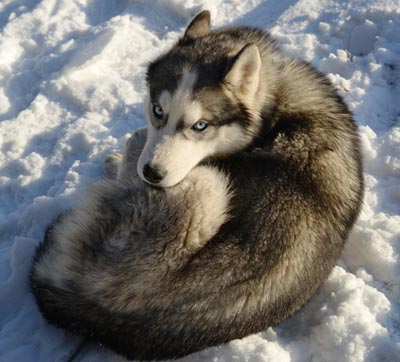Why Do Some Dogs Curl up in a Ball When They Go to Sleep?

It's one of those adorable things that some dogs do, like tilting their heads when you talk to them or wagging their tails slowly when you make eye contact with them across the room: curling up in a ball to sleep. Is there a reason some dogs do this, or are they just trying to be super cute to get some extra treats?
Curling up in a Ball Serves a Purpose Outside
Dogs that live outside often curl up in a ball to sleep for two reasons:
- To keep warm
- To feel more secure
Even though it would probably be more comfortable for your dog to stretch out while she's sleeping, curling up is an innate behavior passed down to her from her ancestors. The tight little ball she makes while she's sleeping helps her conserve body heat, which is often essential when sleeping outside. It also keeps her most vulnerable area, her abdomen, more protected from would-be predators.
Circling and Digging at the Bed Are Also Behaviors Left over from Ancestor Canids
If your dog walks around or spins in circles before settling down to sleep, that is another innate behavior passed down from her wild canine ancestors. Digging at the bed is another of these behaviors because sleeping in a hole can keep a dog warmer or cooler outside depending on the air and ground temperatures. You can learn more here: "Why Do Dogs Spin or Walk Around in a Circle Before Lying Down?"
Help Your Dog Feel More Secure
You can use your knowledge of this powerful canine behavior to help a new dog or puppy feel more secure in your home. Provide her with a cozy dog bed that is just a little bit bigger than herself. Then she can dig at it and curl up inside of it, feeling safe and secure.
You May Also Like These Articles:
Why Does Your Dog Follow You to the Bathroom?
What Your Dog's Tail Can Tell You
Gazing into Your Dog's Eyes Releases Love Hormone
Why Do Dogs Spin or Walk Around in a Circle Before Lying Down?
Why Do Dogs Tilt Their Heads When You Talk?
How to Manage Your Dog's Over-The-Top Greetings
Disclaimer: This website is not intended to replace professional consultation, diagnosis, or treatment by a licensed veterinarian. If you require any veterinary related advice, contact your veterinarian promptly. Information at DogHealth.com is exclusively of a general reference nature. Do not disregard veterinary advice or delay treatment as a result of accessing information at this site. Just Answer is an external service not affiliated with DogHealth.com.

